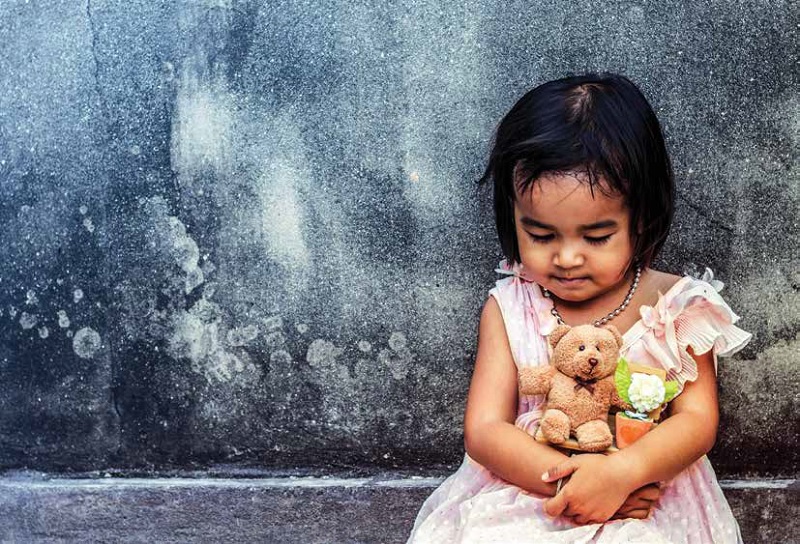Having the love and protection of a family is a gift that many of us take for granted. But around the world today, there are nearly 150 million orphans—children who have lost one or both parents through death, abandonment or separation.
This crisis isn’t just an overseas problem. In Canada, 80,000 children are in the care of child welfare agencies, and 30,000 children are awaiting adoption.
As Christians, we are called to look after orphans, and one way we can do this is through Orphan Sunday.
Church Challenge
Now a global movement, Orphan Sunday is an annual event held on the second Sunday of November. It began with a Zambian pastor in a poor, AIDS-ravaged community and an American visitor, Gary Schneider. While visiting, the pastor gave a sermon calling his congregation to support the orphans around them. In response, the people gave what they had—some even placing their shoes on the altar for the orphans. Schneider was so inspired by what he witnessed that he decided to help local leaders coordinate what became “Orphan Sunday” across Zambia. Since then, the Orphan Sunday movement has spread to more than 60 countries worldwide.
While this movement was developing and growing from Zambia, a separate but related God-inspired initiative began in the United States with a Texan pastor named Aaron Blake. One Sunday in 2004, as he reflected on his experiences as a foster parent, Blake challenged his congregation to consider the plight of foster children in Texas and across America, many awaiting homes, by asking, “Who will stand with me for these kids?” That challenge was the beginning of Stand Sunday, which launched as a global movement along with Orphan Sunday in 2016.
Personal Conviction
Until recently, I was unaware of the global orphan crisis. That changed in 2014 when I read a story about a girl named Katie, an orphan from Bulgaria who was born with Down syndrome and had many special needs. The article shared the story of the suffering she experienced at the orphanage in her home country and the transformation since her adoption by an American family.
With Katie’s story, God opened my eyes and broke my heart for the needs of vulnerable children. He clearly showed me that he wanted me to quit my career as a marine biologist and dramatically shift my life focus. I knew that in this new state of enlightenment, I had to do something. And I wanted everyone to know about the plight of orphans worldwide.
When I learned about Orphan Sunday in the fall of 2014, I was excited to discover that churches around the world were linking their biblical mandate to protect the vulnerable with practical actions to support orphans and vulnerable children.
To the Corps
After learning about Orphan Sunday, my husband and I asked our corps officers here in Parksville, B.C., if Mount Arrowsmith Corps could host a service. The first year, we introduced the concept of Orphan Sunday, educating our congregation about the global and local needs of vulnerable children and our call as Christians to respond. This first Orphan Sunday was well received by our congregation, many of whom told us that they had never considered this topic and thanked us for sharing it.
In subsequent years, we have looked more at some of the tangible ways that we can engage in caring for vulnerable children, including supporting Salvation Army child sponsorship and children’s homes overseas; offering financial support to Canadian families who are adopting (by supporting the organization ABBA Canada); and engaging in the Safe Families Canada movement where churches support at-risk families to hold them together and keep kids from unnecessarily ending up in foster care.
It only takes one consistent, caring adult in the life of a child to make a difference.In 2016, we surveyed our congregation, asking them to consider where they might engage in the care of the fatherless. The results were astounding! We have a small, older congregation and yet the answers weren’t focused on baking cookies, knitting mittens and praying. Many people were interested in being trained and screened as respite providers, providing for the physical needs of children and families, building connections and providing training to the community. This was the foundation for our James 1:27 ministry. We started hosting information sessions and training events.
Last year, we focused on Stand Sunday and looked at engaging with foster care. We highlighted the Safe Families program in more detail, and discussed opportunities to step into the lives of hurting and struggling families in our community. We also took time to pray specifically for families at our church—one family in the process of adopting and another who takes in teens recovering from alcohol and drug addictions. These are families who started attending our corps after we got engaged in the Orphan Sunday movement.
The Bigger Picture
One of the themes that emerged as our corps learned about orphans and vulnerable children is the impact of trauma and “hard pasts” on their development, and how understanding and appropriately responding to their needs could impact our ministry more broadly.
Trauma is a big factor in the lives of most vulnerable children, be it through abuse, neglect, difficult pregnancy or birth, early childhood hospitalization, loss of a loved one, adoption or foster care. If left unaddressed, the trauma can have lifelong impacts, including the inability to have healthy relationships, higher instances of mental or physical illness, higher risk of addiction, homelessness, incarceration, or becoming a victim of human trafficking.
Learning this, I realized that the Orphan Sunday message connects with almost every other area in which we endeavour to change the world. If hurting and broken children become hurting and broken adults, then the biggest way we can change the world around us is to protect and restore children from the effects of trauma.
Consider the impact on The Salvation Army’s social services. What if we saw our clients through the lens of their childhood traumas? Would we approach our lives, ministries and integrated mission differently? I think so.
Or consider how Orphan Sunday links with our children’s ministries and other Salvation Army initiatives such as the Day of Prayer for Victims of Human Trafficking in September. Behind every victim is a story of unmet needs and hurts. How can we pour into the lives of vulnerable children now so that they do not become victims of trafficking later?
To address this issue, Mount Arrowsmith Corps will host a two-day Empowered to Connect trauma training conference this fall—our third time doing so. We will also run a nine-week parent training course, a more in-depth version of a course we hosted last fall. This material has helped us to see how Orphan Sunday and Stand Sunday are just one part of the big picture of who we are and what we do in our community. These initiatives are giving us the tools to be more effective in all that we do.
More Than a Day
Designated days of prayer and action, such as Orphan Sunday and Stand Sunday, are powerful. But to truly have their desired effect, they must be something that we think about more than once every 365 days.
In sharing my conviction and passion that it is our responsibility to care for vulnerable children, I have sometimes heard responses such as “We can’t do it all” and “We can’t participate in every initiative.” Although there is some truth to this, it can be an excuse that puts our conscience at ease as we decide we need not invest the time and energy. Sometimes, we get overwhelmed by the magnitude of needs in our world, thinking that we are being asked to address them by our own means and forget the immeasurable power and authority of our heavenly Father who desires to equip us for his work. I believe that if we’re willing to open our hearts to hear his voice, he will show up, he will speak and he will lead. And where he leads, he will provide.
Not everyone is called to foster, adopt or spend their lives focused on global orphan care, but if we read our Bibles, we see that we are each called to do something. It only takes one consistent, caring adult in the life of a child to make a difference. As Billy Graham said, children who experience love find it far easier to believe in a God who loves them.
This year, I encourage Salvationists to take part in Orphan Sunday or Stand Sunday, and consider how this day of prayer and action can lead to intentional opportunities to share the gospel in all our ministries.
Visit orphansunday.ca and standsunday.ca for more information about these initiatives.
Brandalyn Musial is a soldier at Mount Arrowsmith Corps in Parksville, B.C.
Feature photo: © start08/iStock.com










Leave a Comment